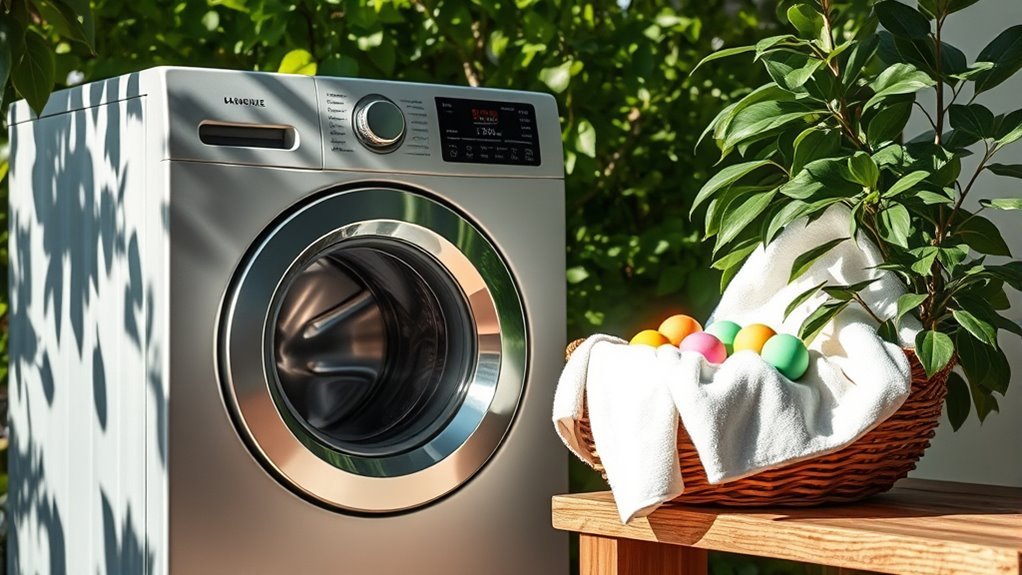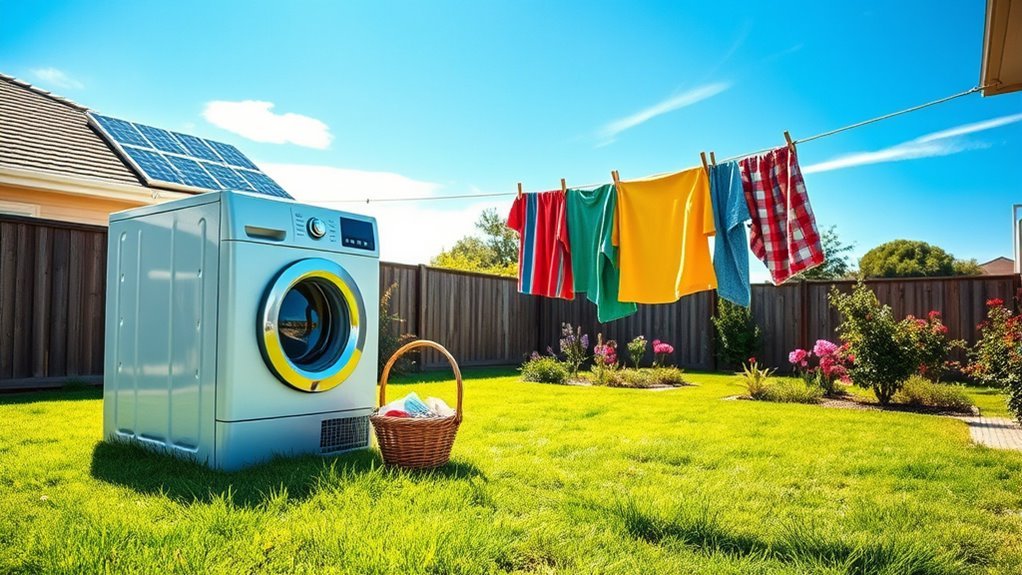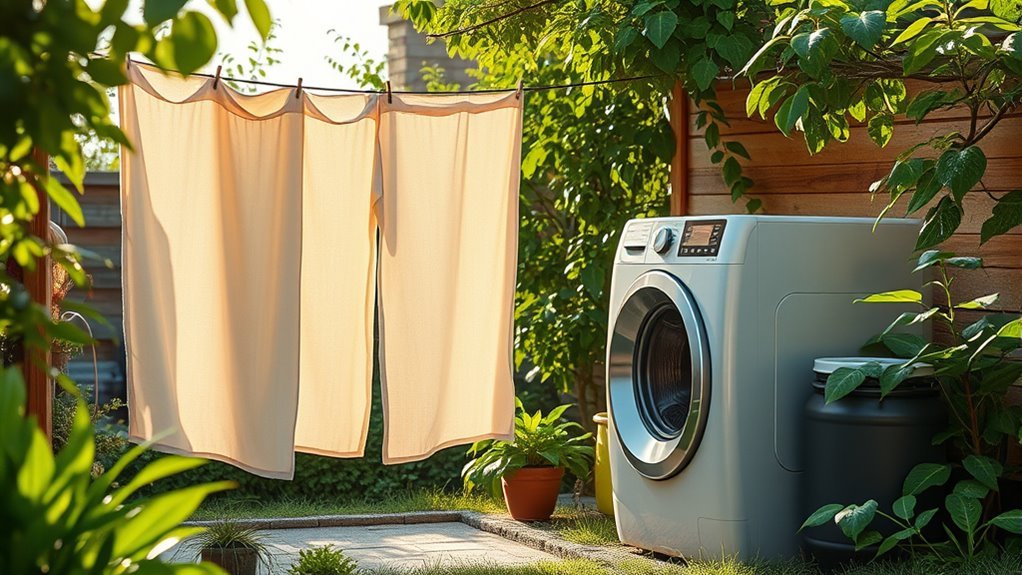Eco-Friendly Alternatives to Washer
You can choose high-efficiency washers that cut water and energy use, saving money and lessening environmental impact. For small loads, manual washing tools reduce water waste and allow control over delicate fabrics. Solar-powered systems lower electricity bills with clean energy. Using natural detergents and cold water cycles further reduces chemicals and energy consumption. Community laundry solutions share resources and costs efficiently. Exploring these options reveals practical ways to lead a more sustainable laundry routine.
Benefits of High-Efficiency Washing Machines

Although high-efficiency washing machines may have a higher upfront cost, they greatly reduce water and energy consumption compared to traditional models. When you invest in these machines, you benefit from significant energy savings due to advanced technology that optimizes water use and cycle duration. This efficiency not only lowers your utility bills but also lessens environmental impact, giving you more control over your resource footprint. Additionally, high-efficiency washers often feature durable components that extend the machine lifespan, meaning fewer replacements and less waste over time. Choosing such a machine aligns with your desire for freedom from excessive energy costs and frequent maintenance. The precision engineering behind these washers guarantees consistent performance, allowing you to embrace an eco-friendly lifestyle without compromising convenience or effectiveness. Furthermore, using biodegradable materials in conjunction with these washers supports sustainability and protects ecosystems.
Using Manual Washing Tools for Small Loads
While high-efficiency washing machines excel at reducing resource use for larger loads, they may not always be the most practical choice for small or infrequent laundry. In such cases, hand washing and portable washers offer eco-friendly alternatives that give you greater control and freedom. Hand washing uses minimal water and energy, making it ideal for delicate garments or single items. Portable washers, compact and easy to operate, provide efficient cleaning without the bulk or energy demands of traditional machines. Studies show manual washing tools can cut water consumption by up to 50% for small loads. By opting for these methods, you reduce your environmental footprint while maintaining autonomy over your laundry habits, especially when dealing with limited space or when traveling. Additionally, incorporating natural cleaning products can enhance the eco-friendliness of your laundry routine.
Advantages of Solar-Powered Laundry Systems

When you harness solar power for your laundry system, you considerably cut down on electricity costs and reduce your carbon footprint. Solar energy provides a renewable, abundant source of power that directly translates to significant cost savings over time. By relying on solar panels to power your washer or dryer, you’re less dependent on grid electricity, which is often generated from fossil fuels. This independence not only lowers your utility bills but also offers energy security—essential for those seeking freedom from fluctuating energy prices. Additionally, solar-powered laundry systems produce zero emissions during operation, aligning with sustainable living goals. With minimal maintenance and long-term durability, these systems represent a precise, efficient investment. Embracing solar energy for laundry empowers you to combine financial prudence with environmental responsibility.
Natural and Biodegradable Detergent Options
Incorporating solar power into your laundry routine is a significant step toward sustainability, but the environmental impact of your detergent choice is equally important. Opting for natural and biodegradable options, such as plant-based detergents, reduces harmful chemicals entering water systems. These detergents, derived from renewable resources, break down more efficiently, minimizing ecological damage. Enzymatic cleaners, a subset of these, target specific stains with biological catalysts, enhancing cleaning power without harsh additives. Studies confirm that enzymatic cleaners require less energy and water, aligning with eco-conscious goals. By choosing these alternatives, you maintain laundry effectiveness while lessening your environmental footprint. This choice empowers you to embrace freedom in daily habits without sacrificing responsibility, supporting a cleaner planet through informed, evidence-based detergent selection. Additionally, selecting gentle, non-abrasive cleaners helps preserve the integrity of your appliances and their finishes, extending their lifespan while maintaining eco-friendly practices.
Water-Saving Techniques in Laundry

You can greatly reduce water consumption by choosing washers designed for efficient water usage, which adjust water levels based on load size. Using cold water for most laundry cycles further conserves resources by cutting energy needed to heat water without compromising cleaning effectiveness. These strategies not only lower your environmental impact but also decrease utility costs over time. Additionally, opting for energy-efficient washing machines can further enhance water and energy savings in your laundry routine.
Efficient Water Usage
Although laundry is a routine household task, its water consumption can be surprisingly high without efficient practices. To embrace water conservation and eco-friendly practices, you need to optimize your washer’s water use. Modern machines with load-sensing technology adjust water levels based on fabric weight, reducing unnecessary water waste. If you use older washers, try running full loads only; half loads still consume nearly the same water amount. Additionally, selecting appropriate wash cycles tailored to fabric types avoids excess water use. By adopting these strategies, you greatly reduce your environmental footprint while maintaining cleaning efficacy. Efficient water usage not only conserves essential resources but also supports your freedom to make sustainable choices without compromising laundry quality.
Cold Water Benefits
When you choose cold water for your laundry, you greatly cut down on energy consumption since heating water accounts for a large portion of a washing machine’s electricity use. Many cold water myths suggest it’s less effective at cleaning, but evidence shows modern detergents and washers perform well in cold settings, maintaining fabric quality without sacrificing cleanliness. By opting for cold water, you can achieve significant energy savings—up to 90% of the energy used for heating water is eliminated. This choice not only reduces your utility bills but also lessens your carbon footprint, granting you more freedom from environmental impact. Embracing cold water washing is a precise, efficient step toward sustainable laundry practices without compromising results.
Cold Water Washing and Its Environmental Impact
Since heating water accounts for a significant portion of a washing machine’s energy use, choosing cold water washing can drastically reduce your household’s carbon footprint. By washing clothes in cold water, you tap into energy savings that directly lower greenhouse gas emissions linked to electricity generation. Studies show cold water washing uses up to 90% less energy compared to warm or hot cycles, making it one of the simplest eco-friendly changes you can adopt. Beyond energy reduction, cold water preserves fabric integrity, extending garment life and reducing waste. While some detergents may perform better in warm water, advances in cold-water formulations guarantee effective cleaning without energy-intensive heating. Embracing cold water washing aligns your practices with environmental responsibility while granting you freedom from excessive utility costs and unnecessary energy consumption.
Community Laundry Solutions for Sustainable Living
Reducing energy consumption through cold water washing is a practical step, but scaling sustainability often requires collective action. By engaging in community sharing initiatives like laundry cooperatives, you can considerably reduce resource use and environmental impact. These models distribute washing loads among multiple households, maximizing machine efficiency and minimizing idle time.
Cold water washing helps, but community laundry cooperatives amplify sustainability by sharing resources and reducing waste.
Key benefits of community laundry solutions include:
- Shared access to energy-efficient washers reduces individual consumption
- Collective maintenance lowers operational costs and extends machine lifespan
- Reduced water waste through optimized load management
- Encourages social responsibility and local environmental awareness
- Supports freedom from owning and maintaining personal appliances
Embracing laundry cooperatives lets you contribute to sustainable living beyond your home, leveraging community resources to lower your ecological footprint effectively. Additionally, managing humidity control in laundry environments can prevent mold growth and reduce allergy triggers, contributing to a healthier living space.
Frequently Asked Questions
How Do Eco-Friendly Washers Compare in Noise Levels to Traditional Washers?
If you’re wondering about noise levels, eco-friendly washers often excel in noise reduction compared to traditional models. They typically feature advanced sound insulation materials and designs that minimize vibrations and operational noise. This means you’ll enjoy a quieter laundry experience, granting you more freedom to focus or relax without disturbance. Evidence suggests these washers maintain efficiency without sacrificing sound control, making them a smart choice if noise is a concern.
Can Eco-Friendly Washers Handle Heavily Soiled Clothes Effectively?
You’ll find that modern eco-friendly washers can handle heavily soiled clothes effectively, thanks to advanced stain removal technologies and optimized washing efficiency. These machines use precise water and detergent dosing, combined with longer wash cycles or specialized settings, to break down tough stains without excess resource use. While they may require slightly more time than traditional models, their performance doesn’t compromise cleanliness, giving you freedom from stubborn dirt with environmental responsibility.
What Is the Average Lifespan of Eco-Friendly Washing Machines?
Like a well-crafted watch, eco-friendly washing machines offer reliability and precision. You can expect an average lifespan of 10 to 15 years, thanks to their energy efficiency and material sustainability, which reduce wear and tear. These washers often use durable materials designed for longevity, giving you freedom from frequent replacements. Investing in one means you’re supporting both your household’s efficiency and environmental responsibility in a smart, evidence-based way.
Are There Any Tax Incentives for Purchasing Eco-Friendly Laundry Appliances?
You might be eligible for tax deductions or energy rebates when purchasing eco-friendly laundry appliances, depending on your location. These incentives are designed to encourage energy efficiency and reduce environmental impact, often backed by government programs. To maximize your benefits, check local, state, and federal guidelines carefully. Understanding these financial perks can empower you to make a smart, cost-effective choice that aligns with your values and budget freedom.
How Do Eco-Friendly Washers Impact Electricity Bills Compared to Standard Models?
When you choose an energy-efficient washer, you’ll notice a significant reduction in electricity bills compared to standard models. These washers use advanced technology to optimize water and power consumption, leading to cost savings over time. By investing in energy efficiency, you’re not only cutting expenses but also gaining freedom from high utility costs. Evidence shows that eco-friendly washers can reduce energy use by up to 50%, making them a smart, budget-friendly choice.






